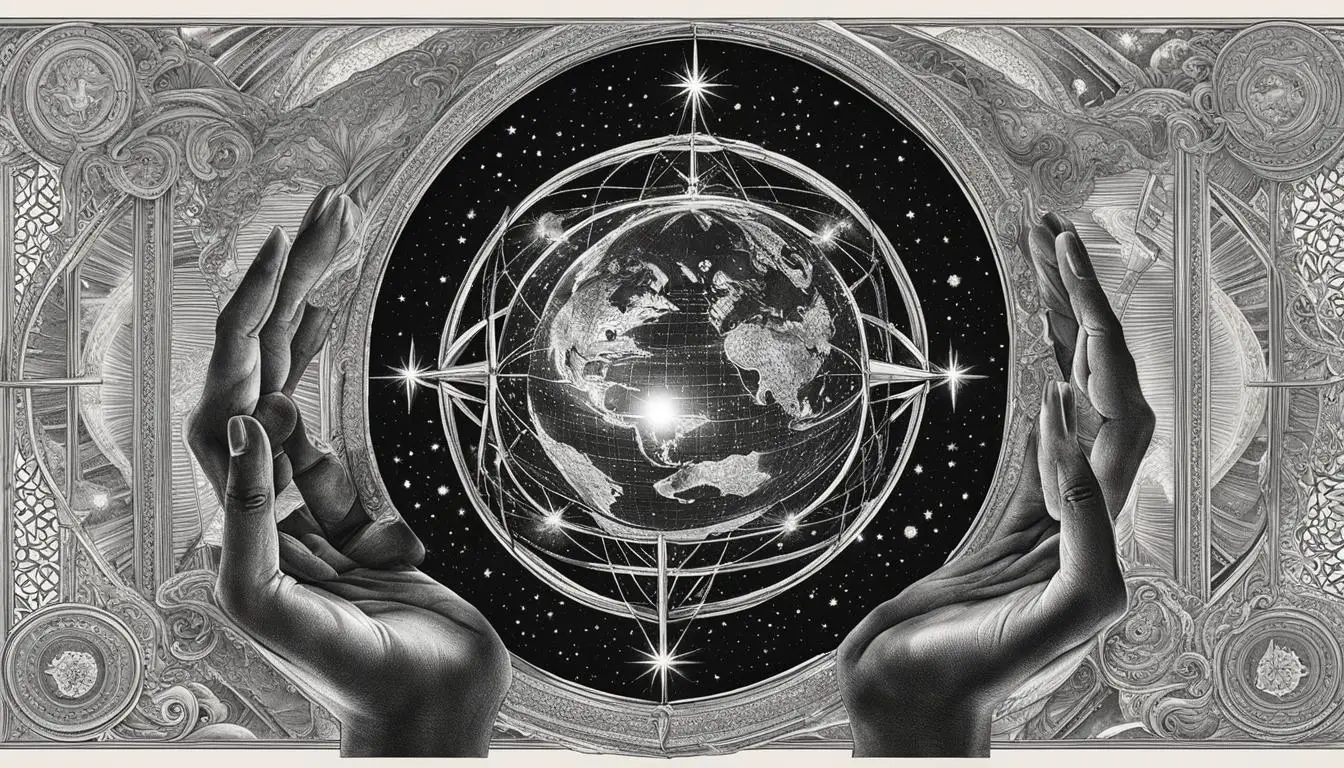The concept of the Bible definition of man is a complex and multi-faceted one. It is rooted in the belief that man was created in the image of God, with a likeness and resemblance to Him. This idea is mentioned in Genesis 1:27, where it states that God created man in His own image. This means that the human race was granted a particular likeness to God, reflecting His divine attributes and nature.
Key Takeaways:
- The Bible defines man as a creation made in the image of God.
- Man’s resemblance to God is not just physical but also includes spiritual attributes.
- The Hebrew word “tselem” and the Greek word “eikōn” emphasize man’s likeness to God.
- Bible verses such as Genesis 1:27 and Colossians 3:10 support the concept of man as an image-bearer of God.
- The biblical understanding of man has moral implications, highlighting the value and worth of every human being.
The Etymology of the Bible Definition of Man
The etymology of the Bible definition of man is rooted in the Hebrew word “tselem,” which means an image or likeness that is carved or cut out. This concept emphasizes that man bears a resemblance to God, though he is not divine. This idea is further reinforced in the New Testament, where man is created after the likeness of God in true righteousness and holiness (Ephesians 4:24). The biblical view of man highlights his unique position as a creation that reflects the glory of God.
In the Greek language, the word for image is “eikōn,” which carries a similar meaning to the Hebrew word “tselem.” The biblical understanding of man emphasizes that he is made in the image of God, reflecting His character and nature. This image is not just in terms of physical appearance but also includes spiritual and moral attributes. The Bible provides various teachings and descriptions of man as a creation intricately designed by God and endowed with the capacity for knowledge, righteousness, and holiness.
The Hebrew Word for Image: “Tselem”
Derived from the Hebrew word “tselem,” the Bible definition of man portrays him as an image or likeness of God. This image is not merely a physical resemblance but encompasses the spiritual and moral attributes that reflect God’s character. It signifies man’s unique position as a creation designed to mirror the glory of God and fulfill His purposes on Earth. The New Testament further affirms this concept, describing man as created after the likeness of God in true righteousness and holiness.
The Greek Word for Image: “Eikōn”
In the Greek language, the concept of the Bible definition of man is captured by the word “eikōn,” which also means an image or representation. This emphasizes that man, as an image-bearer of God, reflects His character and nature. The biblical understanding of man extends beyond physical appearance and encompasses spiritual and moral attributes. The Bible provides teachings and descriptions that highlight man’s capacity for knowledge, righteousness, and holiness, emphasizing his unique identity as a creation intricately designed by God.

| Biblical Verses | References |
|---|---|
| Genesis 1:27 | So God created man in his own image, in the image of God he created him; male and female he created them. |
| Psalm 139:14 | I praise you because I am fearfully and wonderfully made; your works are wonderful, I know that full well. |
| Colossians 3:10 | and have put on the new self, which is being renewed in knowledge after the image of its creator. |
Biblical Verses Supporting the Bible Definition of Man
“So God created man in his own image, in the image of God he created him; male and female he created them.” – Genesis 1:27
“I praise you because I am fearfully and wonderfully made; your works are wonderful, I know that full well.” – Psalm 139:14
“and have put on the new self, which is being renewed in knowledge after the image of its creator.” – Colossians 3:10
The Greek Perspective on the Bible Definition of Man
In the Greek language, the word for image is “eikōn,” which carries a similar meaning to the Hebrew word “tselem.” The biblical understanding of man emphasizes that he is made in the image of God, reflecting His character and nature. This image is not just in terms of physical appearance but also includes spiritual and moral attributes. The Bible provides various teachings and descriptions of man as a creation intricately designed by God and endowed with the capacity for knowledge, righteousness, and holiness.
One of the key passages that highlights this Greek perspective on the Bible definition of man is found in Colossians 3:10. It states, “Put on the new self, which is being renewed in knowledge after the image of its creator.” This verse emphasizes the transformative power of the image of God in believers, as they are renewed in knowledge and righteousness, becoming more like their Creator.
“For those who are in Christ, they are not only forgiven and cleansed but are also being conformed to the image of Christ. This process involves an ongoing renewal of the mind and transformation of the heart, as believers grow in knowledge, righteousness, and holiness.” – The Apostle Paul
The Greek perspective on the Bible definition of man underscores the importance of aligning one’s life with the teachings of Scripture and growing in the likeness of Christ. It emphasizes the potential for spiritual growth and transformation that is available to every believer, as they seek to reflect the image of God in their thoughts, attitudes, and actions.
| Key Points | Biblical Perspective | Greek Perspective |
|---|---|---|
| Image of God in Man | Reflects divine attributes and nature | Emphasizes spiritual and moral attributes |
| Transformation | Renewal through knowledge of Creator | Growing in Christlikeness |
| Endowed Capacities | Capacity for knowledge, righteousness, and holiness | Potential for spiritual growth and transformation |
Bible Verses Supporting the Bible Definition of Man
Several Bible verses support the biblical concept of man, affirming his identity as a creation made in the image of God. These verses provide insights into the significance and unique position of humanity in God’s design.
“So God created mankind in his own image, in the image of God he created them; male and female he created them.” – Genesis 1:27
This verse from Genesis highlights the foundational truth that man was created in the image of God. It emphasizes the divine likeness and resemblance that humanity bears, reflecting God’s attributes and nature.
“I praise you because I am fearfully and wonderfully made; your works are wonderful, I know that full well.” – Psalm 139:14
Psalm 139:14 celebrates the intricate and marvelous workmanship of God in creating man. It acknowledges the intricate design of each individual, highlighting their inherent value and worth as creations made by a loving and intentional Creator.
“…and have put on the new self, which is being renewed in knowledge after the image of its creator.” – Colossians 3:10
In Colossians, the renewal of the image of God is mentioned as believers grow in knowledge and understanding of their Creator. This verse emphasizes the ongoing transformation of individuals to reflect the likeness of their Creator, showcasing the transformative power of God’s work in human lives.
| Bible Verse | Reference |
|---|---|
| Genesis 1:27 | God created mankind in his own image |
| Psalm 139:14 | I am fearfully and wonderfully made |
| Colossians 3:10 | Renewed in knowledge after the image of its creator |
Back in the Day: Historical Perspectives on the Bible Definition of Man
Throughout history, scholars and theologians have offered various perspectives on the Bible definition of man. These perspectives have sought to understand and interpret the biblical teachings on man’s nature, purpose, and relationship with God. Examining historical viewpoints provides valuable insights into the complexity and depth of this topic.
In ancient times, philosophers like Plato and Aristotle contributed to the discussion surrounding the biblical understanding of man. Plato, for instance, emphasized the soul’s immortality and its eternal existence, while Aristotle focused on man’s rationality and capacities for contemplation and virtue. Both philosophers recognized the special place of man in the natural order.
“Man, the rational animal, is the most excellent of all animals and holds a special place in the grand scheme of creation.”
During the Middle Ages, Christian theologians like Augustine and Aquinas delved into the Bible’s teachings on man. Augustine emphasized the fallen nature of man due to original sin, while Aquinas explored the relationship between man’s intellect and will with God’s rational and moral order. These perspectives contributed to the development of Christian anthropology.
Table: Historical Perspectives on the Bible Definition of Man
| Philosopher/Theologian | Perspective |
|---|---|
| Plato | Emphasized the soul’s immortality and man’s spiritual nature. |
| Aristotle | Focused on man’s rationality, contemplation, and virtue. |
| Augustine | Emphasized man’s fallen nature due to original sin. |
| Aquinas | Explored the relationship between man’s intellect and will with God’s moral order. |
These historical perspectives on the Bible definition of man reflect the ongoing dialogue and interpretation of biblical teachings throughout the centuries. They demonstrate the richness and depth of this topic, as well as its significance for understanding humanity’s relationship with God and the world.
As we explore the biblical description of man, it is important to engage with these historical perspectives and consider how they have shaped our understanding of ourselves and our place in the divine plan.
Understanding the Bible Definition of Man Through Bible Stories
The Bible provides numerous stories and accounts that offer insights into the definition of man from a biblical perspective. These stories serve as powerful illustrations of mankind’s relationship with God and the responsibilities that come with being made in His image. By examining some of these key biblical narratives, we can gain a deeper understanding of the Bible’s definition of man.
Adam and Eve in the Garden of Eden
“Then God said, ‘Let us make man in our image, after our likeness. And let them have dominion over the fish of the sea and over the birds of the heavens and over the livestock and over all the earth…’ So God created man in his own image, in the image of God he created him; male and female he created them.” – Genesis 1:26-27
The story of Adam and Eve in the Garden of Eden reveals man’s unique role as a caretaker of God’s creation. Created in the image of God, they were given the task of exercising dominion over the earth and all its creatures. However, they also had the freedom to make choices, and their disobedience resulted in the introduction of sin and its consequences into the world. This story highlights the importance of recognizing our responsibility as image-bearers of God and making choices that align with His will.
The Life of Jesus
“For even the Son of Man came not to be served but to serve, and to give his life as a ransom for many.” – Mark 10:45
The life of Jesus exemplifies the ultimate definition of man according to the Bible. He perfectly embodied God’s image in human form and demonstrated selfless love and service towards others. Through His teachings, miracles, and ultimately His sacrificial death and resurrection, Jesus showed us what it means to fully reflect the image of God. His example calls us to follow in His footsteps, living lives of love, compassion, and service to others.
| Key Bible Stories | Lessons on the Definition of Man |
|---|---|
| Adam and Eve in the Garden of Eden | Responsibility as caretakers of creation |
| The Life of Jesus | Selfless love, service, and reflection of God’s image |
| Noah and the Ark | Faithfulness, obedience, and God’s preservation of mankind |
These are just a few examples of how the Bible uses stories to convey its definition of man. Each narrative provides valuable insights into man’s purpose, responsibilities, and relationship with God. By studying these stories, we can deepen our understanding of what it means to be made in the image of God and strive to live in alignment with His divine design.
The Moral Implications of the Bible Definition of Man
The Bible definition of man goes beyond the physical and delves into the moral implications of our existence. According to biblical teachings, man is not just a product of chance or evolution, but a creation intentionally designed by God. As image-bearers of God, we are called to live in alignment with His standards and purposes, reflecting His righteousness and love in our daily lives.
This understanding highlights the inherent value and worth of every human being, regardless of their background or circumstances. The biblical concept of man emphasizes the importance of treating others with dignity, compassion, and respect. It recognizes that every individual bears the image of God and deserves to be treated accordingly.
Living according to the biblical understanding of man means recognizing our responsibility to exercise dominion on Earth in a manner that reflects God’s character. It means standing up for justice, advocating for the oppressed, and promoting righteousness in all areas of life. This includes how we treat the environment, how we engage in business and politics, and how we interact with our fellow human beings.
“Do to others as you would have them do to you.” – Luke 6:31
This commandment from Jesus embodies the moral implications of the Bible definition of man. It calls us to treat others with the same love, respect, and kindness that we desire for ourselves. It provides a guiding principle for our interactions and relationships, reminding us of our responsibility to uphold the dignity and worth of every individual.
| Implication | Explanation |
|---|---|
| 1. Human Equality | The Bible teaches that all human beings are equal in the eyes of God, regardless of their race, gender, or social status. This calls us to reject discrimination and prejudice, and to treat all individuals with fairness and equity. |
| 2. Ethical Responsibility | The Bible definition of man emphasizes our ethical responsibility to live in accordance with God’s commandments. This includes pursuing righteousness, justice, and love in all aspects of life, and holding ourselves accountable for our actions. |
| 3. Compassion and Empathy | Understanding that we are all image-bearers of God compels us to show compassion and empathy towards others. It calls us to reach out to those in need, to care for the vulnerable, and to extend a helping hand to those who are suffering. |
Today’s World: Application of the Bible Definition of Man
In today’s world, the Bible definition of man continues to shape various perspectives and guide our understanding of human nature and behavior. While there may be different opinions and interpretations influenced by cultural, philosophical, or scientific beliefs, the biblical perspective on man remains relevant and provides a strong foundation for navigating the complexities of the modern world.
When we apply the biblical perspective on man, we gain valuable insights into our purpose, value, and relationships with God and others. It reminds us that every individual is created in the image of God, deserving of dignity, compassion, and respect. This understanding helps us cultivate a deep sense of empathy and humility, recognizing the inherent worth of every human being.
Furthermore, embracing the Bible definition of man prompts us to live in alignment with God’s intended design for humanity. It calls us to exercise responsible stewardship of the Earth, caring for the environment and its resources. It also challenges us to pursue justice, seek reconciliation, and promote peace in a world marked by division and strife.
Ultimately, the application of the Bible definition of man invites us to pursue a higher standard of morality and righteousness. It reminds us that our actions and choices have consequences, not only in our personal lives but also in the broader context of society. By living according to the biblical teachings on man, we contribute to a more just, compassionate, and harmonious world.
Conclusion: Embracing the Bible Definition of Man
The Bible definition of man is a profound and multi-dimensional concept that emphasizes the unique position of humanity as creations made in the image of God. It encompasses spiritual, moral, and relational aspects, highlighting our purpose, value, and responsibilities in the world.
Understanding and embracing the biblical view of man can bring clarity, guidance, and a sense of purpose to our lives, allowing us to live in alignment with God’s intended design for humanity. By recognizing that we are made in the image of God, we can strive to reflect His character and nature in our thoughts, words, and actions.
Furthermore, the Bible definition of man reminds us of the inherent worth and value of every human being. It calls us to treat others with dignity, compassion, and respect, acknowledging that each person bears the image of God. Embracing this perspective can foster unity, love, and justice in our relationships and interactions with others.
In a world that often promotes self-centeredness and individualism, embracing the biblical view of man can provide a solid foundation for understanding our purpose, value, and relationship with God and others. By aligning our lives with God’s intended design, we can experience true fulfillment and contribute to the flourishing of humanity.
FAQ
What is the Bible definition of man?
The Bible defines man as a creation made in the image of God, reflecting His divine attributes and nature.
What is the etymology of the Bible definition of man?
The Hebrew word “tselem” and the Greek word “eikōn” both emphasize that man bears a resemblance to God, though he is not divine.
Are there Bible verses that support the Bible definition of man?
Yes, Genesis 1:27, Psalm 139:14, and Colossians 3:10 are some verses that highlight man as a creation made in the image of God.
What do historical perspectives say about the Bible definition of man?
Historical perspectives recognize man’s unique position as a creation designed to reflect the glory of God and fulfill his purpose on Earth.
How do Bible stories help us understand the Bible definition of man?
Bible stories like Adam and Eve, Noah and the Ark, and the life of Jesus showcase the relationship between God and man, as well as man’s responsibilities as an image-bearer of God.
What are the moral implications of the Bible definition of man?
The Bible highlights the importance of living in alignment with God’s standards and treating others with dignity, compassion, and respect, as every individual bears the image of God.
How does the Bible definition of man apply to today’s world?
In today’s world, there are different opinions and interpretations, but the biblical perspective on man remains relevant and provides a strong foundation for understanding our purpose, value, and relationship with God and others.
Why is it important to embrace the Bible definition of man?
Embracing the Bible definition of man brings clarity, guidance, and a sense of purpose to our lives, allowing us to live in alignment with God’s intended design for humanity.








Leave a Reply